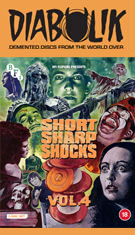

B&W/Color, 1948-1980, 223 mins
BFI (Blu-ray) (UK RB HD)
B&W/Color, 1948-1980, 223 mins
BFI (Blu-ray) (UK RB HD)


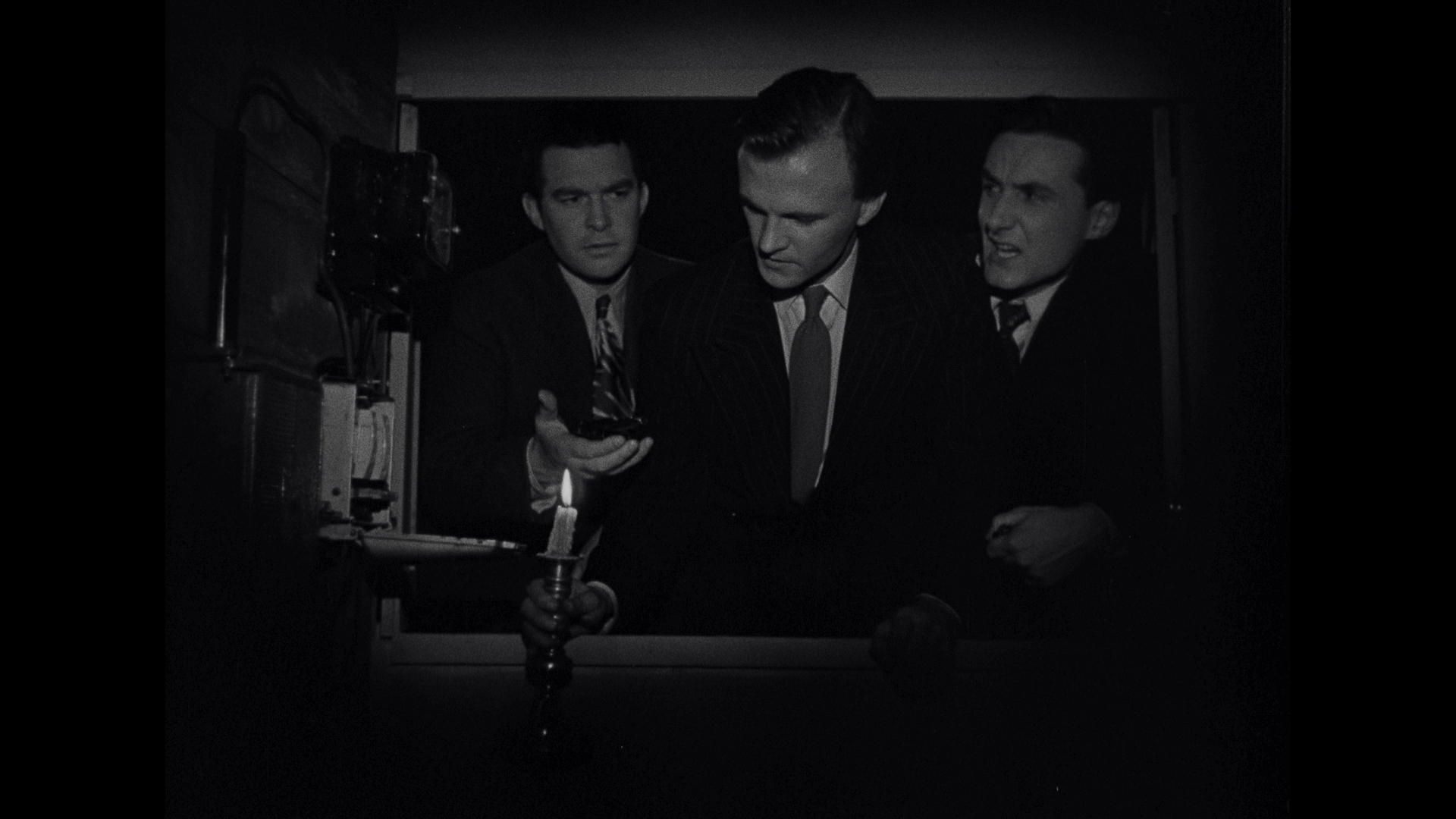 series of double-disc Blu-ray collections of chilling short subject (following the first one
series of double-disc Blu-ray collections of chilling short subject (following the first one 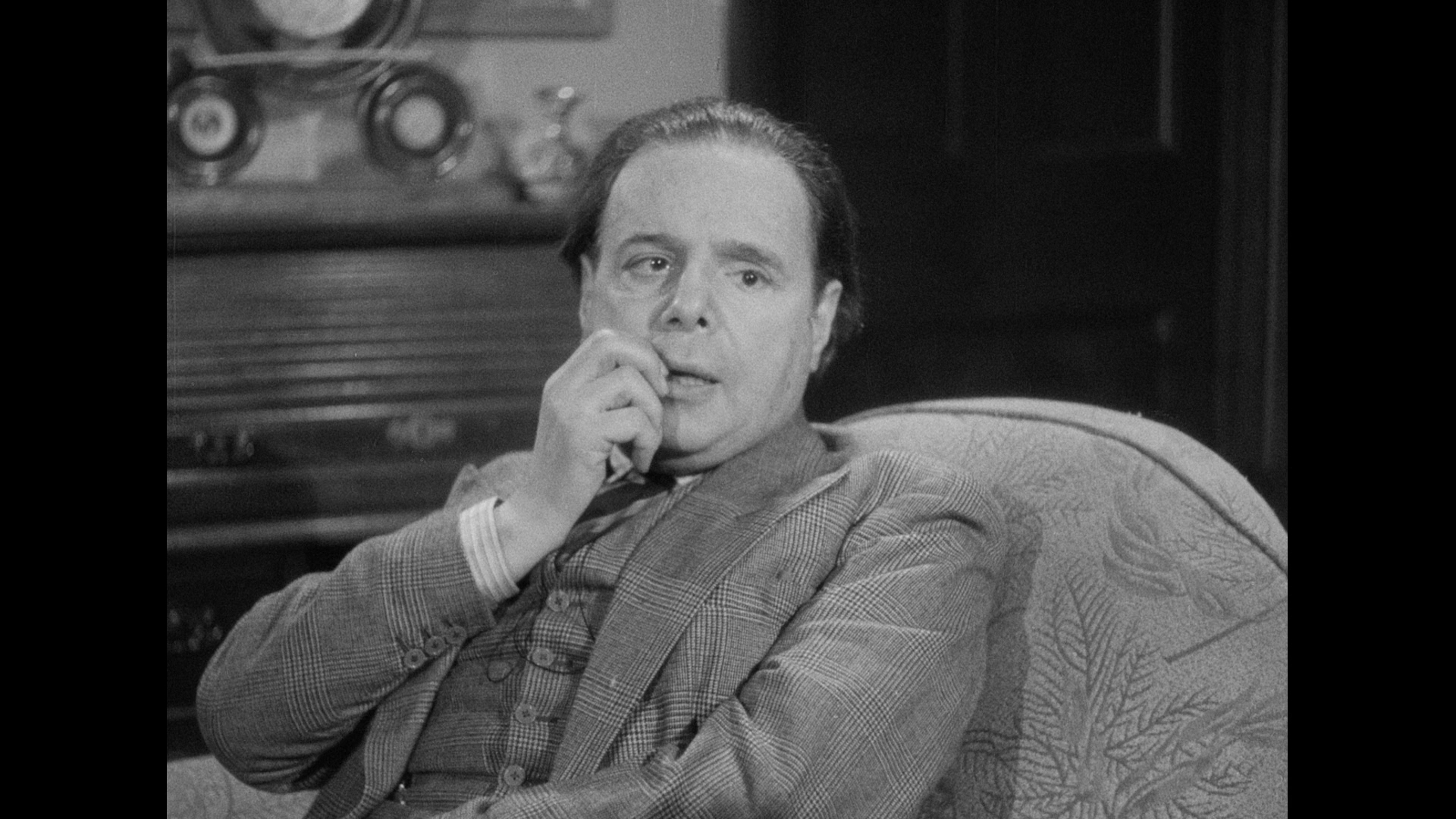 in 2020 and the second in 2021), the four long-awaited installment arrived in 2025 with a fresh slate of offerings ranging from quaint monochrome quickies to an ambitious widescreen mini-epic. In fact, the set kicks off with one of its heaviest hitters, the once frustratingly rare 1948 cult favorite The Fatal Night (49m35s). One of multiple adaptations of the spooky 1925 Michael Arlen short story "The Gentleman from America" (later remade in more compact form as an episode under its original title for Alfred Hitchcock Presents), this almost feature-length treat is a rare foray into horror for Italian-born British filmmaker Mario Zampi who would soon become one of the country's finest golden age comedy directors. The strangely structured story centers around the wager accepted by American visitor Puce (Lester Ferguson) with two Brits, Cyril (Leslie Armstrong) and Tony (an unrecognizably young Patrick Macnee), to win a tidy sum of money if he stays in a haunted house overnight. Armed with a candle and a revolver, he settles in and reads a blood-freezing tale about the ill-fated sisters who once lived in the house, a scenario that seems to be threatening his overnight stay. Complete with an embellished dream sequence and a memorable bedside attack, this is a stylish, atmospheric film that packs a fairly strong punch for '40s horror that only a few of its British peers (most notably Dead of Night) managed to surpass. What flaws it has are baked into the source material, namely a final act that relies on multiple extreme contrivances and lets its most loathsome character off without even a warning. Featuring a Columbia logo at the beginning, the element here (a duplicate positive) is in good shape and, as with almost all the other films here, features a solid LPCM 1.0 English mono track with optional
in 2020 and the second in 2021), the four long-awaited installment arrived in 2025 with a fresh slate of offerings ranging from quaint monochrome quickies to an ambitious widescreen mini-epic. In fact, the set kicks off with one of its heaviest hitters, the once frustratingly rare 1948 cult favorite The Fatal Night (49m35s). One of multiple adaptations of the spooky 1925 Michael Arlen short story "The Gentleman from America" (later remade in more compact form as an episode under its original title for Alfred Hitchcock Presents), this almost feature-length treat is a rare foray into horror for Italian-born British filmmaker Mario Zampi who would soon become one of the country's finest golden age comedy directors. The strangely structured story centers around the wager accepted by American visitor Puce (Lester Ferguson) with two Brits, Cyril (Leslie Armstrong) and Tony (an unrecognizably young Patrick Macnee), to win a tidy sum of money if he stays in a haunted house overnight. Armed with a candle and a revolver, he settles in and reads a blood-freezing tale about the ill-fated sisters who once lived in the house, a scenario that seems to be threatening his overnight stay. Complete with an embellished dream sequence and a memorable bedside attack, this is a stylish, atmospheric film that packs a fairly strong punch for '40s horror that only a few of its British peers (most notably Dead of Night) managed to surpass. What flaws it has are baked into the source material, namely a final act that relies on multiple extreme contrivances and lets its most loathsome character off without even a warning. Featuring a Columbia logo at the beginning, the element here (a duplicate positive) is in good shape and, as with almost all the other films here, features a solid LPCM 1.0 English mono track with optional 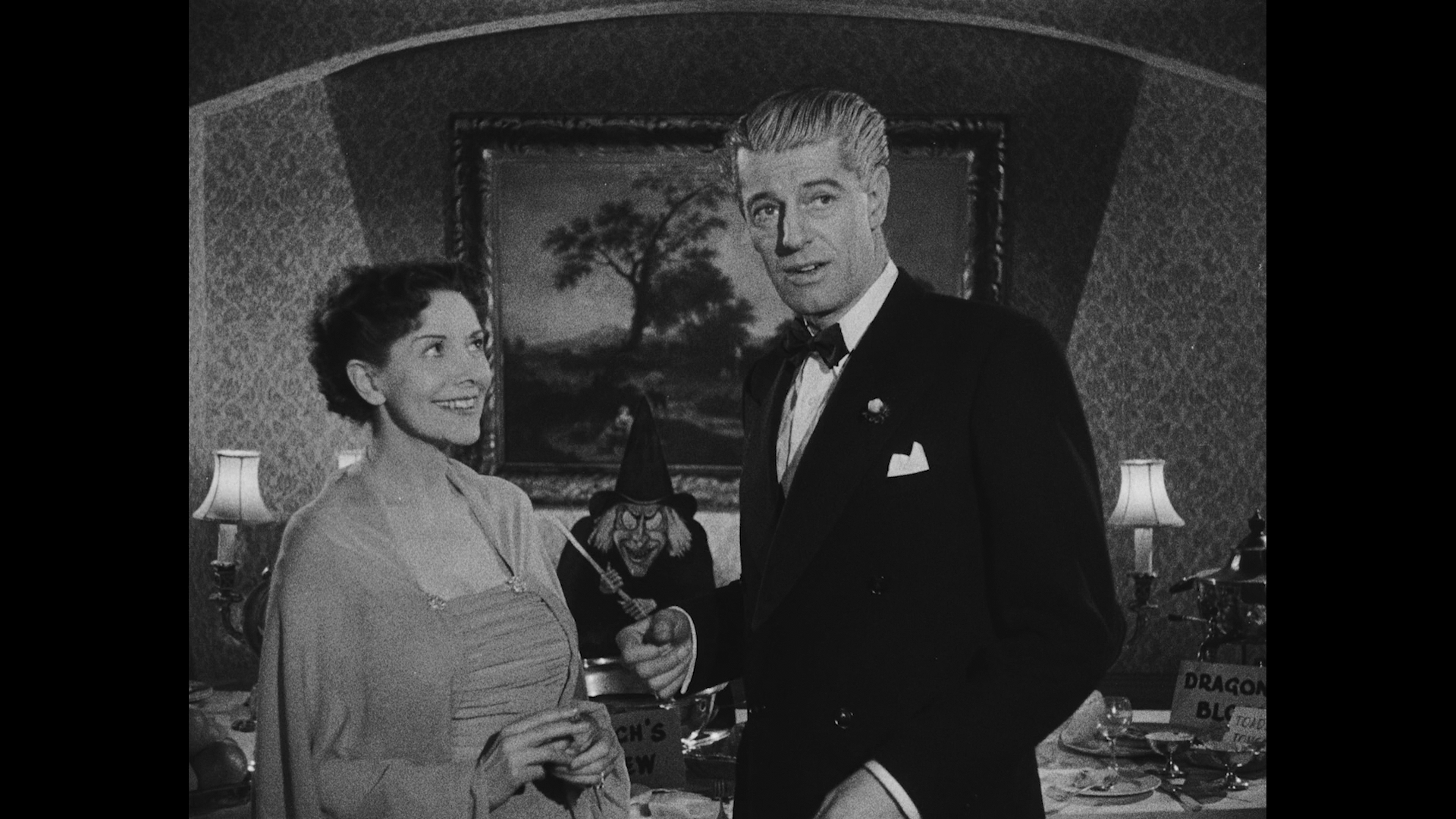 English SDH subtitles.
English SDH subtitles. 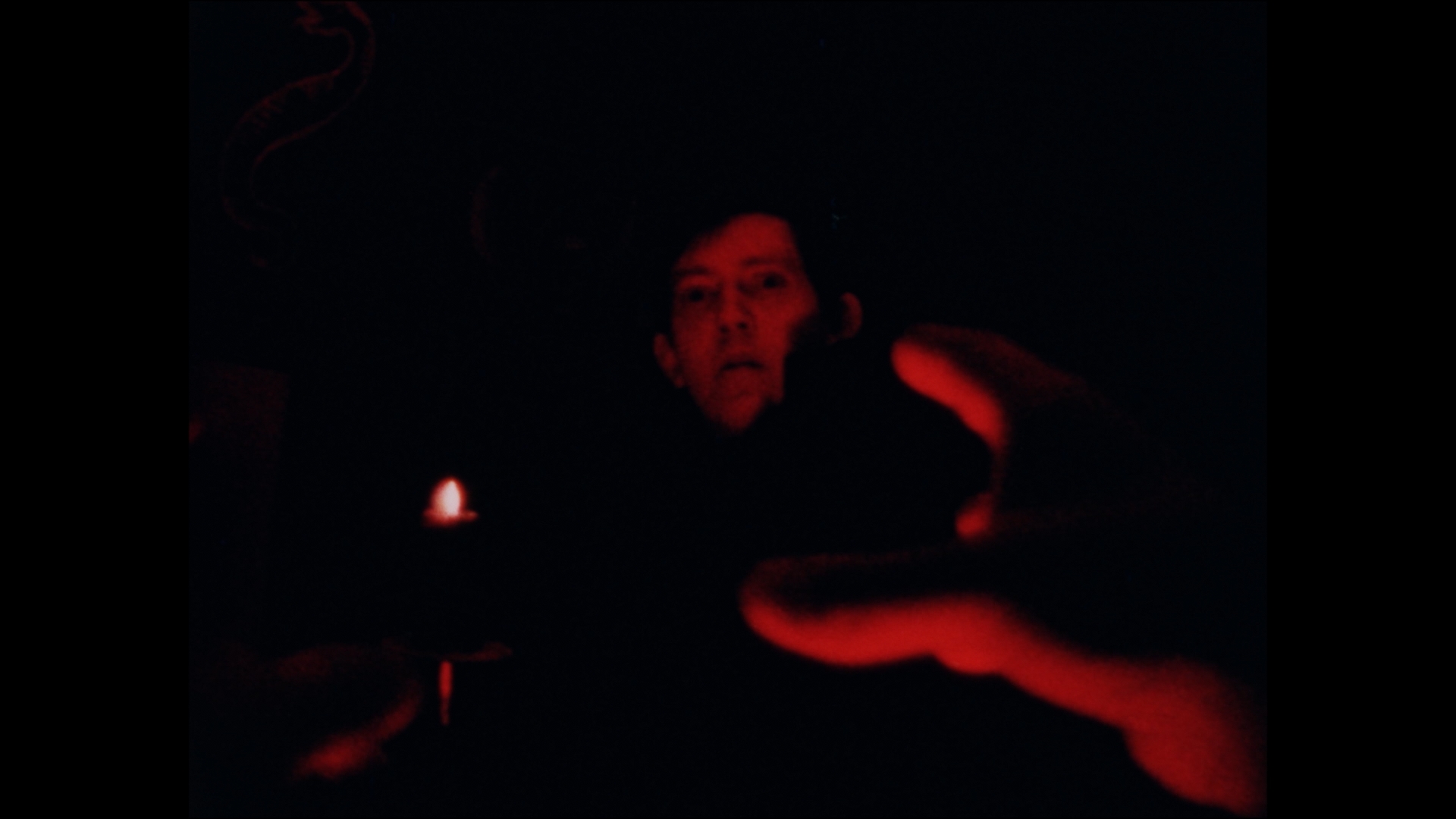 freaky music score justify its inclusion here as we're treated to what amounts to an odd precursor to Dr. Terror's House of Horrors with palm reader Cosmo meeting some strangers one night at a hotel. They end up sharing a train carriage the following morning where his readings that portend disaster. Fans of prior volumes will recognize the Strange Experiences series of bite-sized paranormal stories represented here with two entries told by Peter Williams, 1955's Halloween Party (3m19s) about an inexplicable guest at a social gathering and 1956's The Laughing Clown (3m40s) about a creepy seaside attraction with a tragic backstory. Both are over before you know it but worth a peek, with the latter quite ambitious in its storytelling scope.
freaky music score justify its inclusion here as we're treated to what amounts to an odd precursor to Dr. Terror's House of Horrors with palm reader Cosmo meeting some strangers one night at a hotel. They end up sharing a train carriage the following morning where his readings that portend disaster. Fans of prior volumes will recognize the Strange Experiences series of bite-sized paranormal stories represented here with two entries told by Peter Williams, 1955's Halloween Party (3m19s) about an inexplicable guest at a social gathering and 1956's The Laughing Clown (3m40s) about a creepy seaside attraction with a tragic backstory. Both are over before you know it but worth a peek, with the latter quite ambitious in its storytelling scope. 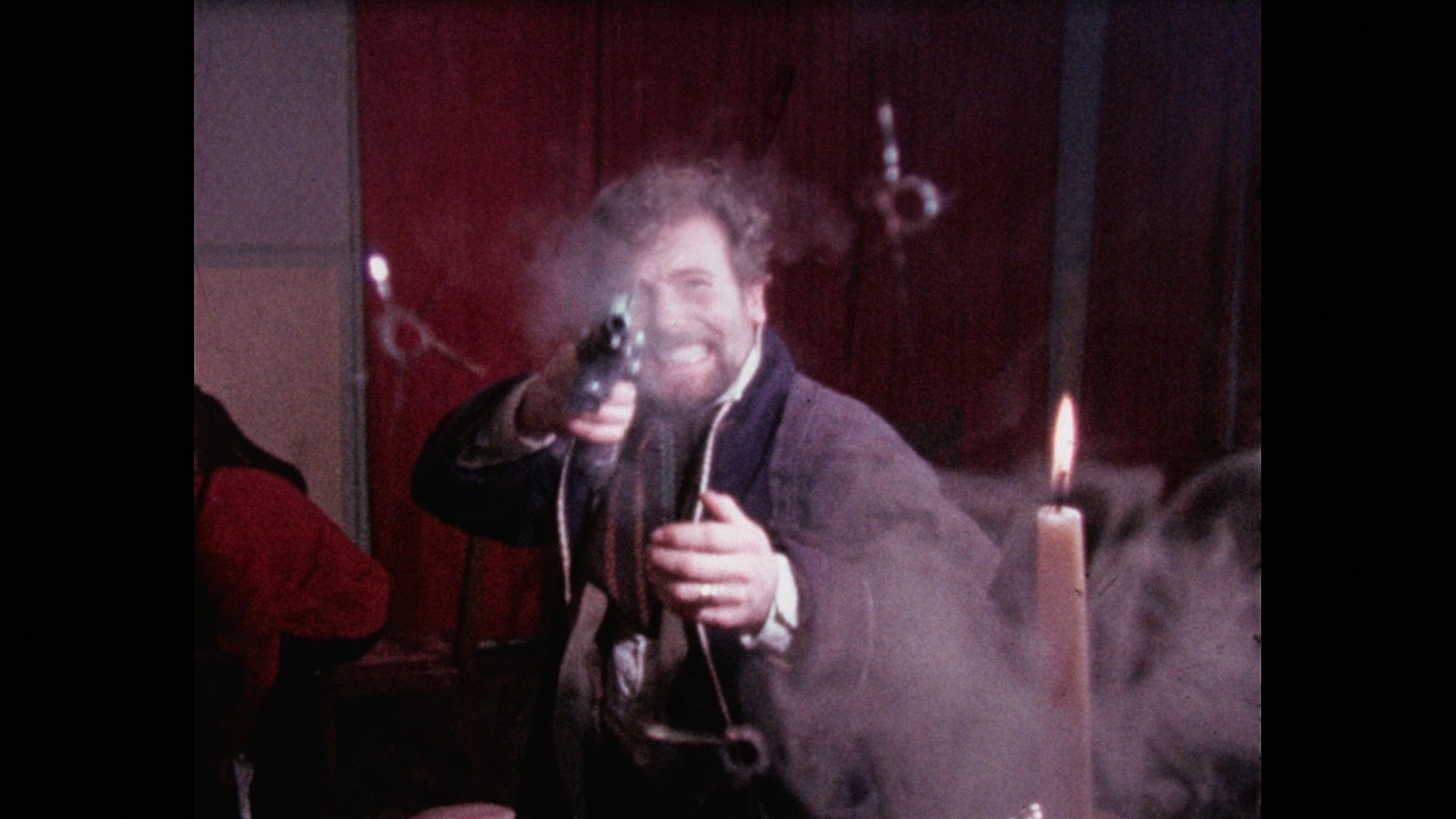 Things go horribly and homicidally wrong, and it turns out their target was an occultist with a terrifying secret in his home. Though very ragged in quality, this has a strong student film charm to it with a bonkers payoff at the end loaded with devilish imagery and wild colorful lighting. Then you get 1969's Mirror Mirror (7m53s), a mysterious little 16mm curio from amateur film club Eastbourne Cine Group. Almost devoid of dialogue, it follows a man who buys a mirror on sunny afternoon, takes it home, and gets pulled into a robbery it witnessed with a violent sting in the tale. Again, it's scruffy but enjoyable with a nifty ending. Also on the disc are extras starting with "It Happened That Night" (10m15s), an interview with Mario Zampi Jr. about his dad's move to the U.K in the early '30s and process of working up the production system, the process of learning British attitudes and sense of humor, the Zampi connection to Pizza Express, and the family's story including time in boarding school where Zampi
Things go horribly and homicidally wrong, and it turns out their target was an occultist with a terrifying secret in his home. Though very ragged in quality, this has a strong student film charm to it with a bonkers payoff at the end loaded with devilish imagery and wild colorful lighting. Then you get 1969's Mirror Mirror (7m53s), a mysterious little 16mm curio from amateur film club Eastbourne Cine Group. Almost devoid of dialogue, it follows a man who buys a mirror on sunny afternoon, takes it home, and gets pulled into a robbery it witnessed with a violent sting in the tale. Again, it's scruffy but enjoyable with a nifty ending. Also on the disc are extras starting with "It Happened That Night" (10m15s), an interview with Mario Zampi Jr. about his dad's move to the U.K in the early '30s and process of working up the production system, the process of learning British attitudes and sense of humor, the Zampi connection to Pizza Express, and the family's story including time in boarding school where Zampi 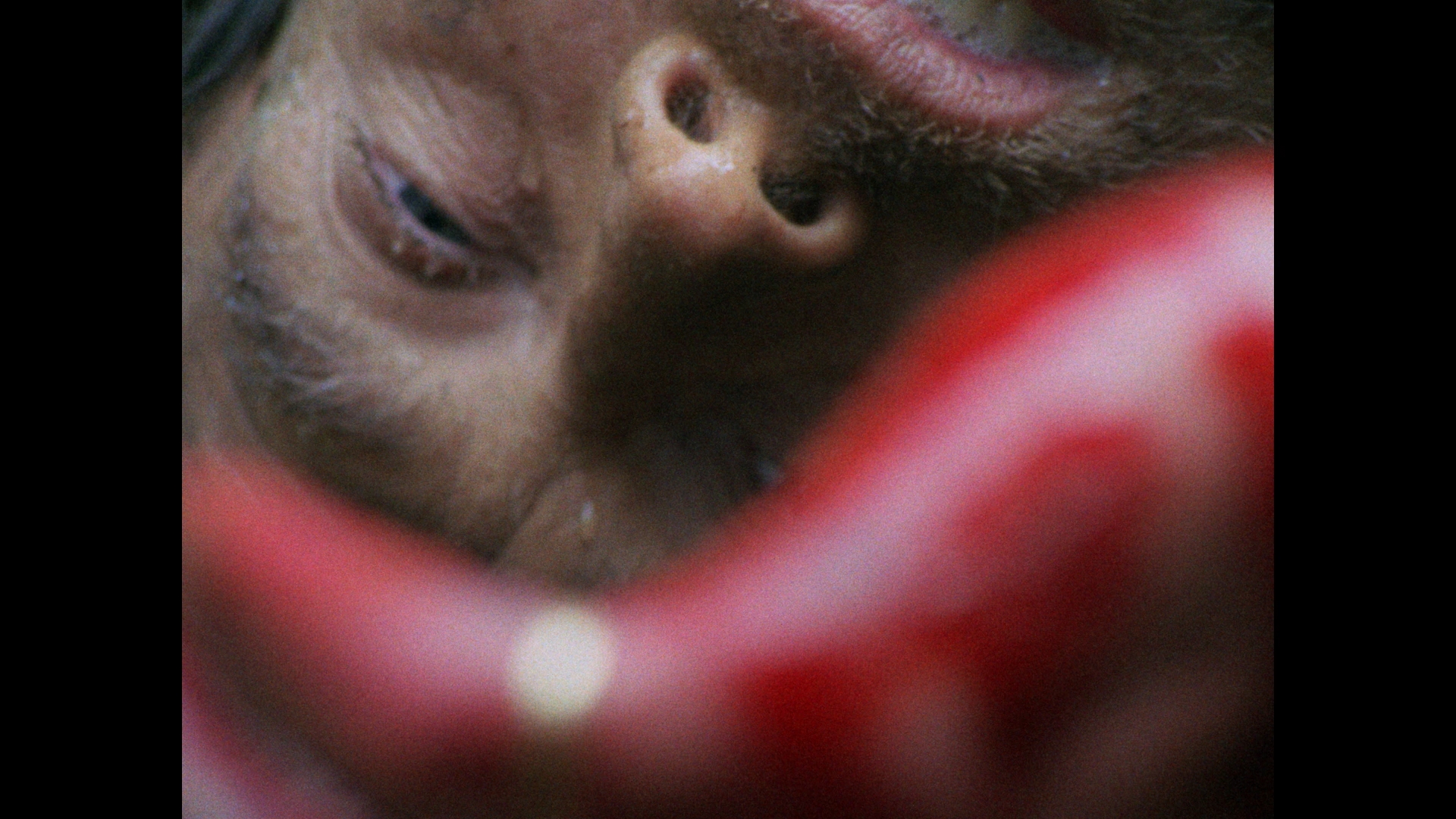 Sr.'s films would occasionally run. In "The Devil Upstairs" (17m1s), actor John Attfield recalls starring in Night Ride and having a longstanding friendship with Meikle starting in school that ignited a mutual love of horror. Also included are behind the scenes footage (4m21s) and outtakes (1m15s) from Night Ride and galleries for The Fatal Night and Death in the Hand.
Sr.'s films would occasionally run. In "The Devil Upstairs" (17m1s), actor John Attfield recalls starring in Night Ride and having a longstanding friendship with Meikle starting in school that ignited a mutual love of horror. Also included are behind the scenes footage (4m21s) and outtakes (1m15s) from Night Ride and galleries for The Fatal Night and Death in the Hand.  Enigmatic and devoid of any dialogue, it's a gritty mood piece that fits the aesthetic of the series well. Then things get charged up considerably with the 1976 Gothic shocker Red (23m58s) directed by Euro sex comedy actress Astrid Frank, which played as a supporting feature in the U.K. to Damien: Omen II and probably brought the house down. Horror vet Ferdy Mayne stars as a painter who gets lost in the countryside and finds lodgings at an inn run by Frank herself. There he spends company with a trio of troubadours (Horror House's Mark Wynter, Brit TV staple Gabrielle Drake, and actor-singer
Enigmatic and devoid of any dialogue, it's a gritty mood piece that fits the aesthetic of the series well. Then things get charged up considerably with the 1976 Gothic shocker Red (23m58s) directed by Euro sex comedy actress Astrid Frank, which played as a supporting feature in the U.K. to Damien: Omen II and probably brought the house down. Horror vet Ferdy Mayne stars as a painter who gets lost in the countryside and finds lodgings at an inn run by Frank herself. There he spends company with a trio of troubadours (Horror House's Mark Wynter, Brit TV staple Gabrielle Drake, and actor-singer  Roy North under a pseudonym, all doing way more nudity than you'd expect), who sing for their supper and figure in a truly nightmarish experience later that night. Fans of José Ramón Larraz (Vampyres) should get a big kick out of this one with its deranged plunge into sex and violence, though to say any more would spoil the fun. Plus it features that beloved '70s Amicus font! Then things get even freakier with the mental psychosis study Sanctum (18m55s) from filmmaker Bill Davison, starring a very fearless Pete Steggall as a young man tormented by his evil doppelganger and writhing in bed in a religious-tainted sexual frenzy. This definitely won't be for everyone (keep it away from the kids for sure), but it's very potent and features a new experimental score by The Begotten that really gets under your skin. Of course, this set wouldn't be complete without some educational film trauma -- and that's exactly what you get with a pair of Play Safe shorts from 1978, Frisbee (1m11s) and Electricity (10m56s) showing the horrific fates children will suffer when they play carelessly around public
Roy North under a pseudonym, all doing way more nudity than you'd expect), who sing for their supper and figure in a truly nightmarish experience later that night. Fans of José Ramón Larraz (Vampyres) should get a big kick out of this one with its deranged plunge into sex and violence, though to say any more would spoil the fun. Plus it features that beloved '70s Amicus font! Then things get even freakier with the mental psychosis study Sanctum (18m55s) from filmmaker Bill Davison, starring a very fearless Pete Steggall as a young man tormented by his evil doppelganger and writhing in bed in a religious-tainted sexual frenzy. This definitely won't be for everyone (keep it away from the kids for sure), but it's very potent and features a new experimental score by The Begotten that really gets under your skin. Of course, this set wouldn't be complete without some educational film trauma -- and that's exactly what you get with a pair of Play Safe shorts from 1978, Frisbee (1m11s) and Electricity (10m56s) showing the horrific fates children will suffer when they play carelessly around public 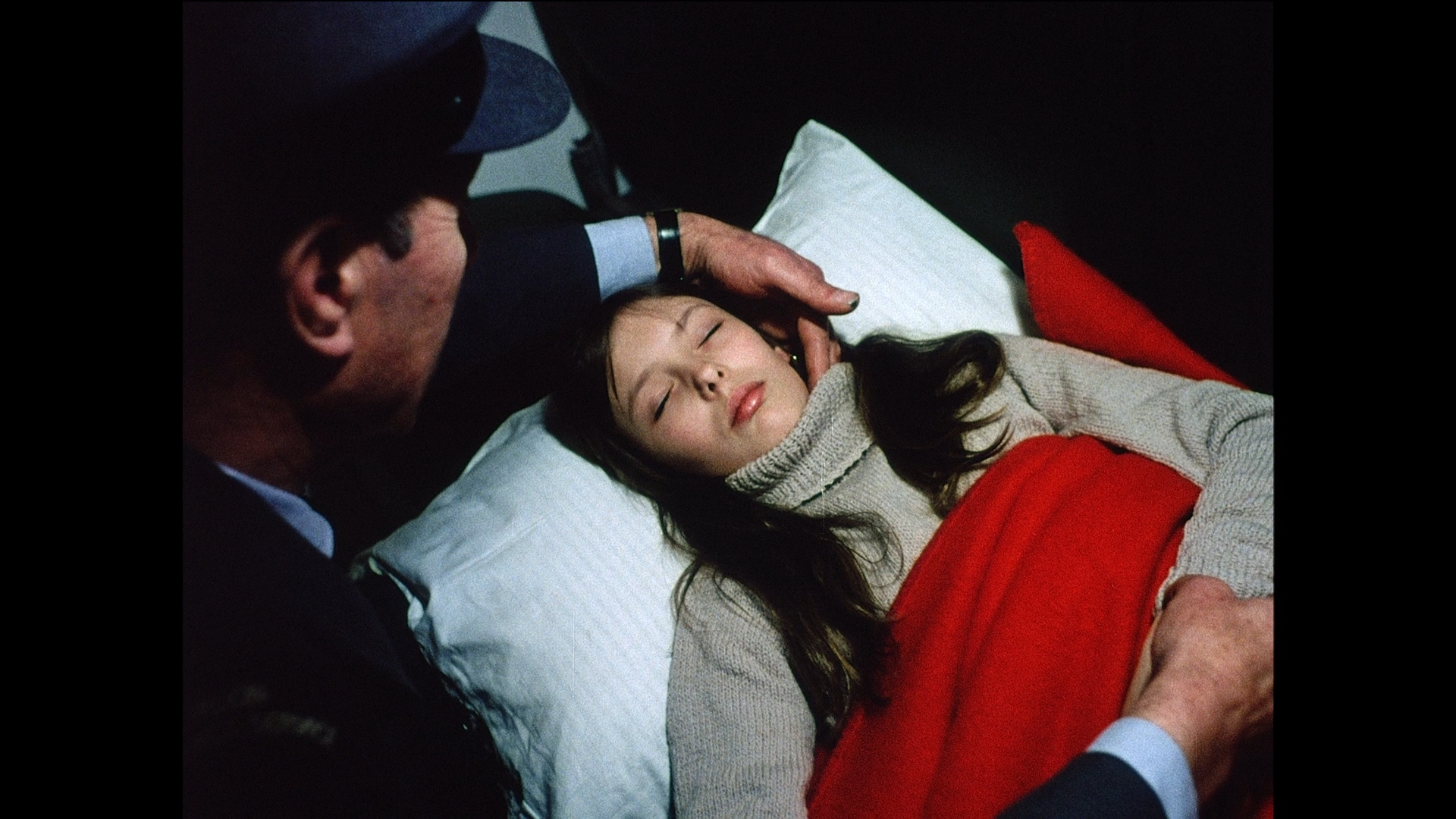 electrical areas. The latter is especially horrific since it also injects some cute animation to drive the point home.
electrical areas. The latter is especially horrific since it also injects some cute animation to drive the point home.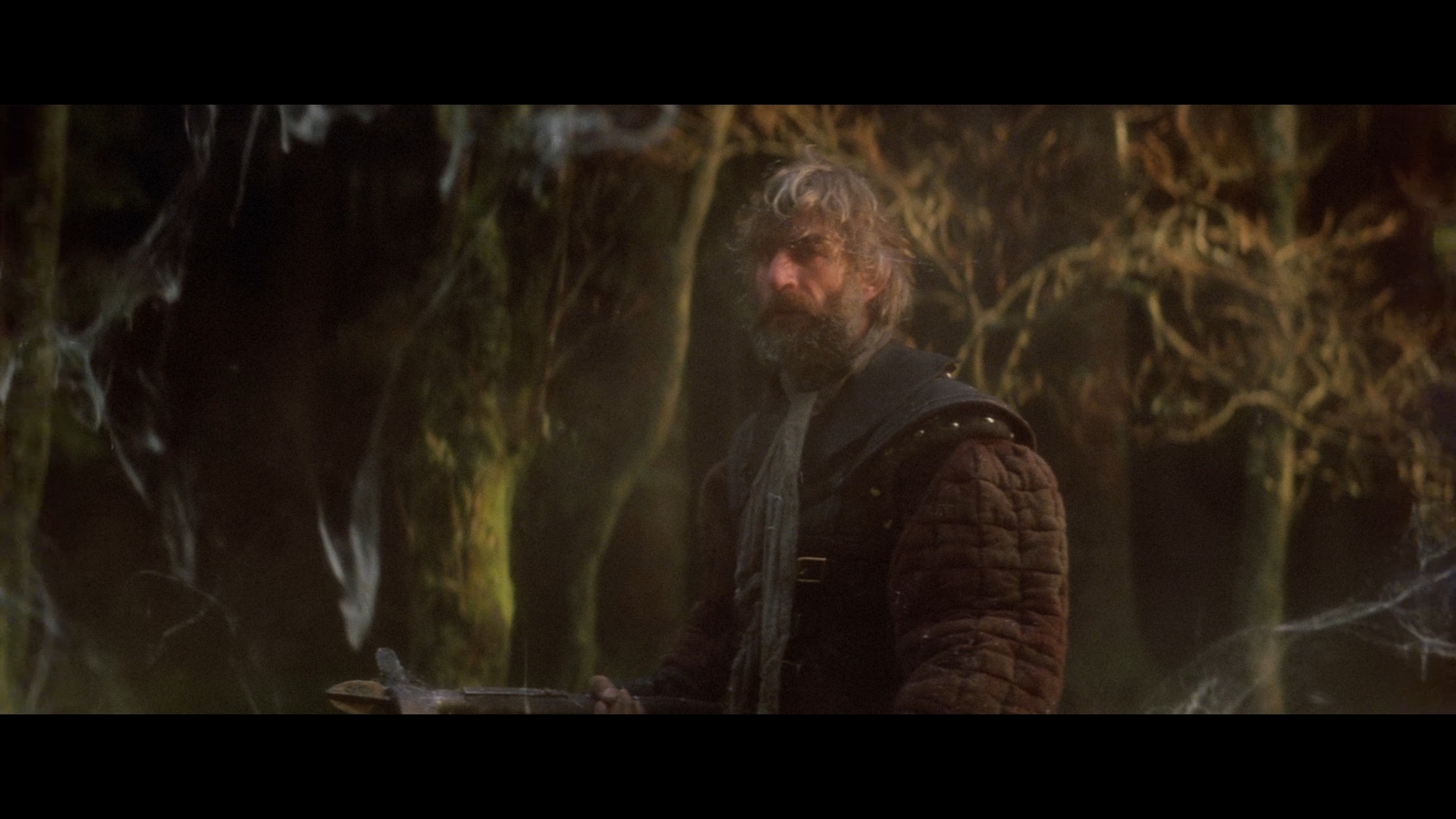 here), the film charts the phantasmagorical experiences of Sir Maddox (Tony Vogel), a knight who comes back from battle to find his homeland ravaged by what appears to be the plague, sending him on a mission involving an ethereal maiden and a possibly supernatural foe. Beautifully shot and executed throughout, this is a key entry in the wave of fantasy films that proliferated throughout the '80s and is presented here in a gorgeous restoration from the recovered, once-lost negative. Extras here kick off with "The Colour of Blood" (18m19s) with Astrid Frank chatting about her childhood escape from Prussia (now Poland), her lifelong interest in the arts including time with UFA, her nonchalant attitude to nudity, and the path that led to making Red as a calling card as well as her happiness with the final result. It's a real shame she only directed two shorts, as she very clearly had the passion and chops to pull off a major directing career. Then in "Over the Mountains" (21m29s), director Roger Christian (who went on to The Sender, Nostradamus, and, ahem, Battlefield Earth) covers the making of Black Angel including his background scraping together money to get to London, his awakening to filmmaking via Doctor Zhivago and A Man and a Woman, his love of Arthurian legends, and his relationships that came into play making this film including composer Trevor Jones (who ironically jumped from this to Excalibur). Also included are image galleries for Frank and Davison's careers and Black Angel. The first pressing also comes with an insert booklet featuring invaluable essays by Jonathan Rigby, Vic Pratt, Josephine Botting, William Fowler, and personal reminiscences by Astrid Frank, Bill Davison, and Roger Christian.
here), the film charts the phantasmagorical experiences of Sir Maddox (Tony Vogel), a knight who comes back from battle to find his homeland ravaged by what appears to be the plague, sending him on a mission involving an ethereal maiden and a possibly supernatural foe. Beautifully shot and executed throughout, this is a key entry in the wave of fantasy films that proliferated throughout the '80s and is presented here in a gorgeous restoration from the recovered, once-lost negative. Extras here kick off with "The Colour of Blood" (18m19s) with Astrid Frank chatting about her childhood escape from Prussia (now Poland), her lifelong interest in the arts including time with UFA, her nonchalant attitude to nudity, and the path that led to making Red as a calling card as well as her happiness with the final result. It's a real shame she only directed two shorts, as she very clearly had the passion and chops to pull off a major directing career. Then in "Over the Mountains" (21m29s), director Roger Christian (who went on to The Sender, Nostradamus, and, ahem, Battlefield Earth) covers the making of Black Angel including his background scraping together money to get to London, his awakening to filmmaking via Doctor Zhivago and A Man and a Woman, his love of Arthurian legends, and his relationships that came into play making this film including composer Trevor Jones (who ironically jumped from this to Excalibur). Also included are image galleries for Frank and Davison's careers and Black Angel. The first pressing also comes with an insert booklet featuring invaluable essays by Jonathan Rigby, Vic Pratt, Josephine Botting, William Fowler, and personal reminiscences by Astrid Frank, Bill Davison, and Roger Christian.![]()